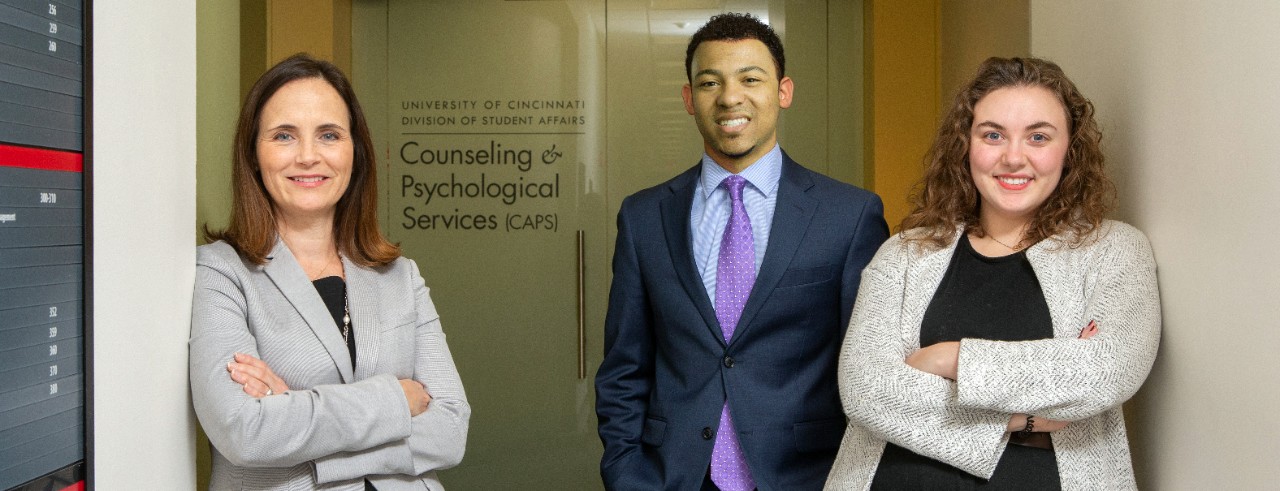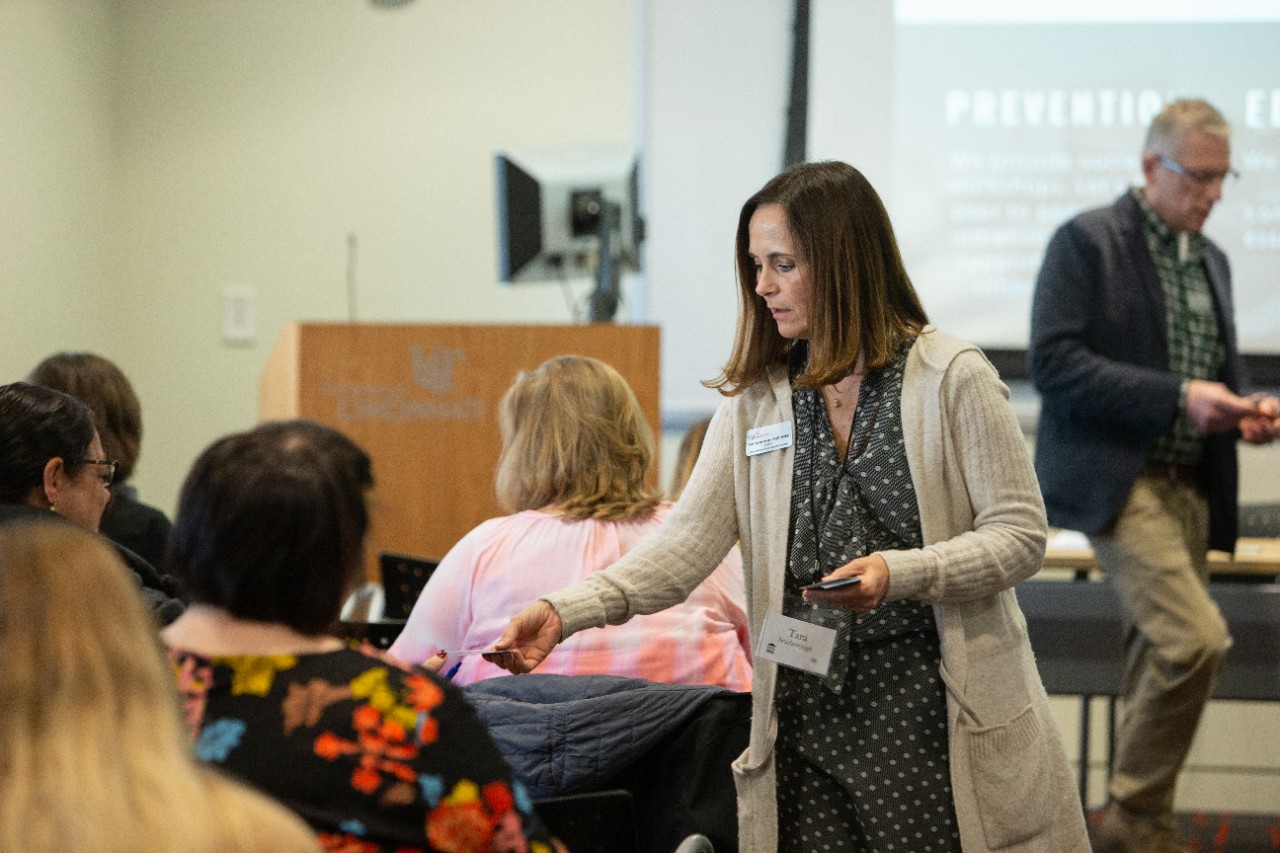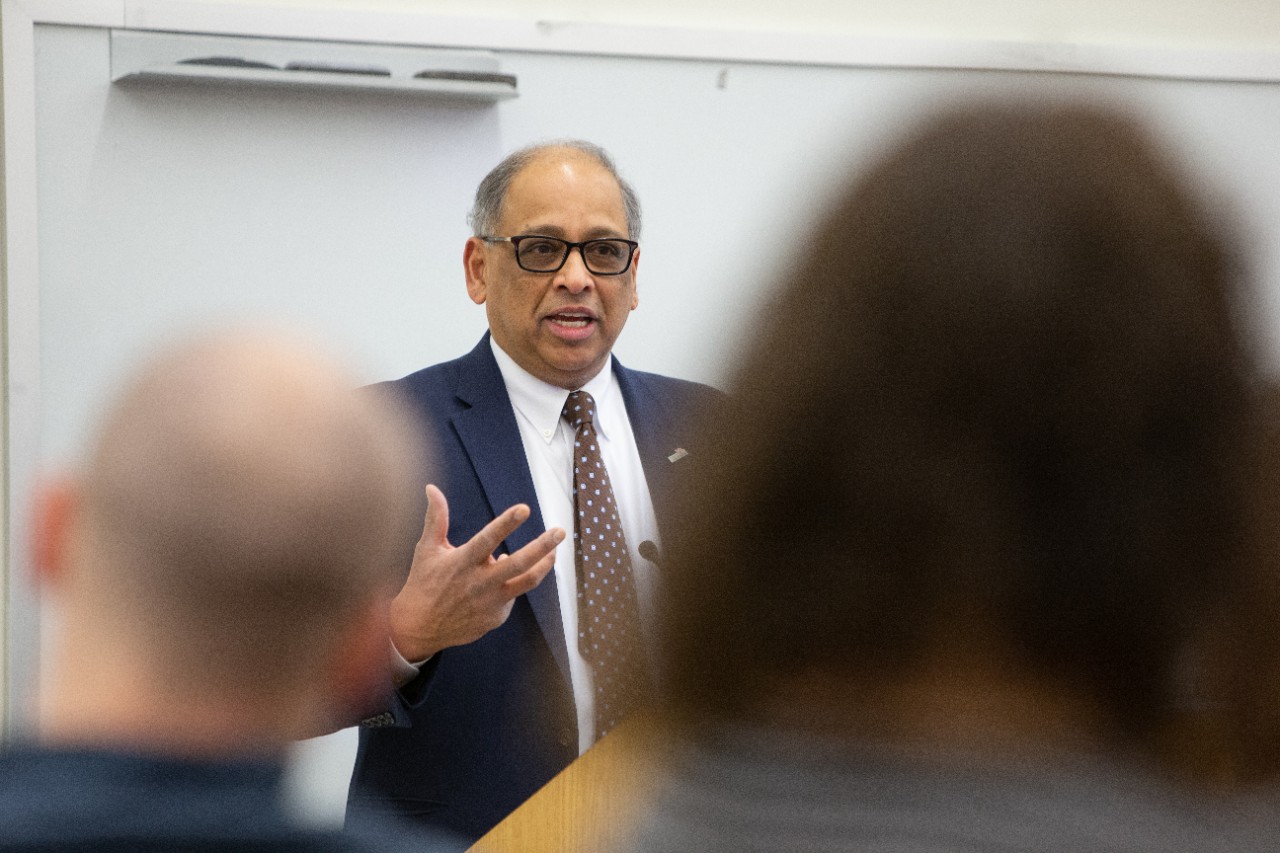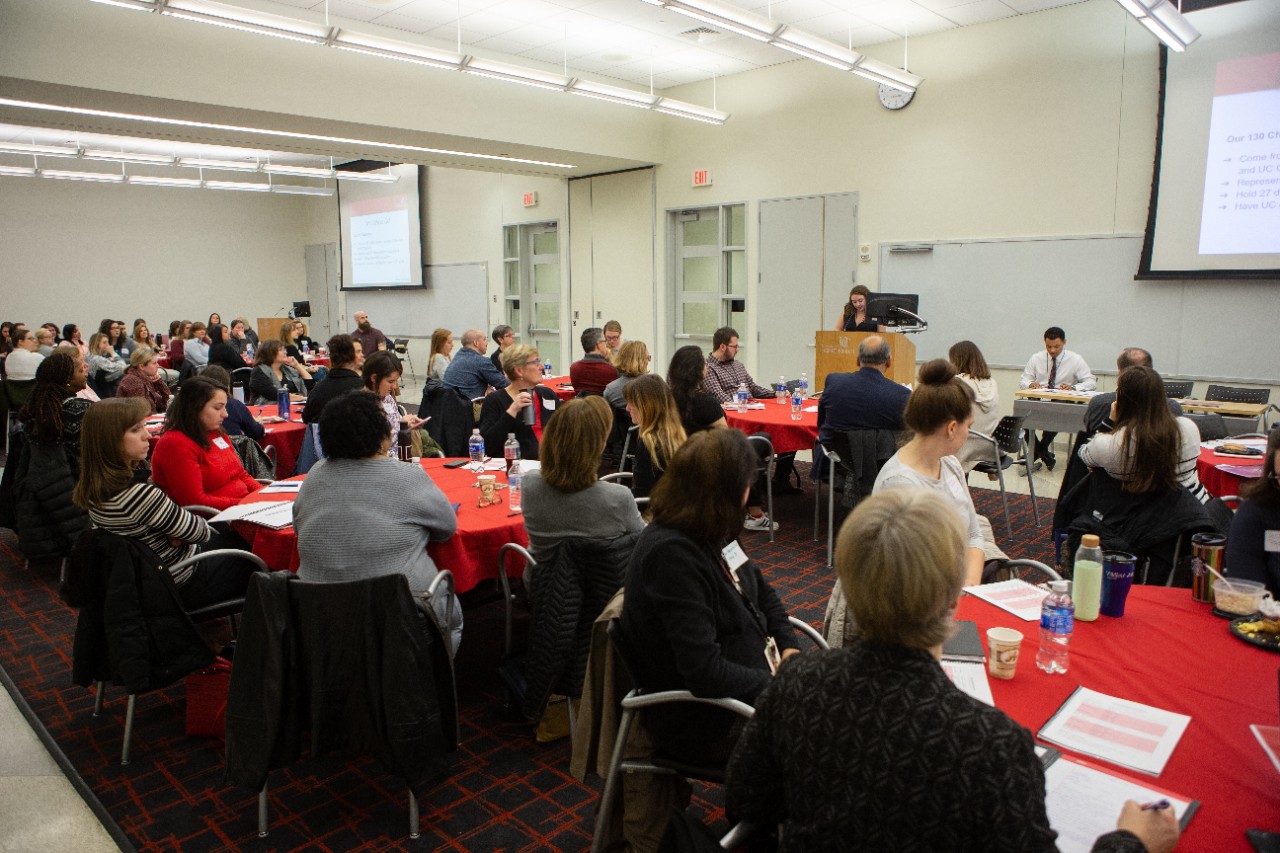
Student Government, university team on new Mental Health Champions program
The example of a caring faculty member helped inspire new effort with 130 faculty, staff volunteers
When the University of Cincinnati Student Government and UC Counseling and Psychological Services recently asked for faculty and staff volunteers to serve as Mental Health Champions, the student leaders hoped to attract a total of 30 to 40 volunteer applicants to the pioneering effort.
That goal was topped the first day the volunteer applications were distributed among associate deans. Within 24 hours, 58 faculty and staff signed on, with the applicant numbers rising from there.
Ultimately, 130 faculty and staff representing every college and 60 departments returned to campus ahead of the spring semester for their first day of training as program volunteers.
New effort first inspired by caring faculty member
The higher-than-expected response to Student Government’s initial call for volunteers to serve as Mental Health Champions is apt for a program that was first inspired by a caring faculty member.
According to Abbie Smith, Student Government vice president, that faculty member was Ric Sweeney, associate professor of marketing in the Carl H. Lindner College of Business.
Smith recalled when she and Chandler Rankin, Student Government president, both took a class taught by Sweeney early in their student careers: “There was one student who was doing so well in class. He was performing very well academically, engaged in the class and coursework, but then suddenly something changed. It was clear he was really struggling to come to class, not turning in assignments, even falling asleep. It was a sudden shift.”
That one-time struggling student later returned to his former engagement and achievement level, thanks in part to outreach by Sweeney at that time.
Recalled Sweeney, “After noting that the student was shutting down, I do recall reaching out to the student with a simple email asking: ‘Is everything O.K.?’”
The student responded, “No. Can I come talk to you?”
Sweeney further recounted, “In a follow-up conversation, the student wondered if he had made the right decision about college, about UC, about other aspects of his life. We talked about how he might manage his concerns and responsibilities. It was a one-time conversation and a small contribution of my time to listen but having someone care did seem to help.”
Sweeney added that the student now has a “incredibly promising future,” and they stay in touch occasionally about future plans.
“Sometimes, we as faculty don’t always appreciate our impact,” concluded Sweeney.
Student Government’s Rankin agreed, “We need all hands on deck to build the culture of care and support that we need for our students. Faculty and staff are on the front lines of students’ everyday lives.”
New Mental Health Champions are already at work
Sarah O’Connell, International Services adviser, is already practicing some of the skills she is learning as a Mental Health Champion and is following Sweeney’s example. She recalled that in January, “I had a student of concern who I had not heard from after reaching out in a more generic way. Previously, I may have left it there. But this time, I sent one more personalized message and got a response. By clearly expressing that I was worried about the student and cared about her, I was able to encourage her to come into the office for an appointment that very day. She said it was the first time she felt like someone cared, and it’s so gratifying to know that the ‘extra mile’ made a difference.”
Other faculty and staff have already provided feedback after the first Mental Health Champions training session that they will personally walk students in need of assistance to CAPS, will make sure that teaching assistants are aware of resources and will share what they learn through the program with colleagues.
According to Student Government’s Rankin, “Hearing the feedback that our Champions have shared about the impact of this program, even in such a short time, inspires us to keep pressing forward. Having a legacy that we took a tangible step that was needed through establishing the program is one that makes me very proud of all our collective work this year.”

UC is launching a new initiative to provide support for student mental health. Faculty and staff volunteers recently gathered for training. Photo/Andrew Higley/UC Creative Services
Increasing need
At the initial training for the Mental Health Champions, Rankin stated that the need for such efforts can be found “throughout all rigorous academic environments nationally. There are high levels of stressors for students around academic achievement, professional and work requirements, along with financial needs and social pressures. Statistics show that mental health is a growing need and an increasing concern for those ages 18-24 in particular. In terms of percentage growth, mental health needs are outpacing enrollment gains.”
For instance, according to the most recently published Center for Collegiate Mental Health Annual Report, the use of university counseling centers increased 30 to 40 percent on average from fall 2009 to spring 2015. By comparison, average enrollment growth during that period was five percent.
At UC, Counseling and Psychological Services experienced a 36 percent increase in service utilization in 2019-20 versus the previous academic year, and a 115 percent increase over the past five years.
Rankin added that the Mental Health Champions program would not take the place of professional psychology and psychiatric resources currently available to the campus community via Counseling and Psychological Services, University Health Services / College of Medicine Department of Psychiatry, Student Wellness Center, UC Health and Human Resources. Also participating in the new Mental Health Champions program is the National Alliance on Mental Illness.
There are three tiers of care, according to the Student Government leaders:
- The most intensive: one-on-one counseling and therapy.
- The intermediate: use of a support network or group therapy.
- The fundamental tier: the proactive culture of care that can be furthered by the Mental Health Champions and others.
Said Smith, “This fundamental level of care is what all of us can do, and the number of students who need demonstrated concern and compassion by those they interact with every day far outpaces the numbers that need one-on-one counseling at CAPS. If we can provide a listening ear, an authentic caring connection for a student, it’s a step in the right direction that perhaps prevents a later health risk.”

UC President Neville Pinto speaks at the first training session for volunteers participating in the new Mental Health Champions initiative. Photo/Andrew Higley/UC Creative Services
Partnership across campus
The student leaders approached UC President Neville Pinto and Provost Kristi Nelson with the idea early last fall and began working closely with CAPS Executive Director Tara Scarborough.
At the program’s January orientation, President Pinto saw it as a natural fit with the university’s Next Lives Here strategic direction and vision to proactively support student success, inclusivity and academic excellence.
He added, “The fact that our university has had such a strong response to this initiative is an indication of the level of compassion that exists in our campus community as well as the determination to address this crucial need. Adding to the urgency is the fact that college can be a time when serious mental health conditions begin to become apparent and is a critical opportunity to intervene and help.”

University of Cincinnati faculty and staff are volunteering to serve as Mental Health Champions. Photo/Andrew Higley/UC Creative Services
Next steps
The 130 faculty and staff volunteers will be trained in identifying signs of distress in students and will be equipped to better engage with students and make referrals to resources. Once the Mental Health Champions have completed their training in May, they will be designated as champions online and by means of posters within their respective units.
According to Provost Nelson, “We can make a difference and improve the lives of our students, to listen to concerns and issues, and refer to resources. We want to do everything we can to make sure they are successful here at the University of Cincinnati and that they will have rewarding and productive lives when they leave the university.”
Other new efforts as well as existing resources
According to Debra Merchant, vice president for Student Affairs, “Mental health is a wider community issue, with multiple resources on and off campus that provide access by a variety of means.”
The range of these services span from individual and group counseling, Let’s Talk programs where counselors visit colleges, peer-to-peer support, 24/7 crisis helpline, online therapy and more.
For instance, UC Counseling and Psychological Services’ offerings are listed online. These include
- Crisis Emergent Services
- Brief Treatment Services
- Lower Intensity Services
- Campus and Community Referrals for Suicide Prevention
University Student Health Services also has therapy and psychiatric services available.
Community-based services always include Emergency 911 as well as Talbert House crisis line, Women Helping Women, Mental Health Access Point, MindPeace and national resources.
In addition, the National Suicide Prevention Lifeline, 1-800-273-8255, is a United States-based suicide prevention network of 161 crisis centers that provides a 24/7, toll-free hotline available to anyone in suicidal crisis or emotional distress.Replace with your text
Top image: From left, Tara Scarborough, executive director of Counseling & Psychological Services; undergraduate Student Government President Chandler Rankin; and undergraduate Student Government Vice President Abbie Smith. Photo/Andrew Higley/UC Creative Services
Related Stories
'Paradigm-shifting' study confirms effectiveness of long-acting HIV treatment
February 26, 2026
The results of a clinical trial involving the University of Cincinnati, recently published in The New England Journal of Medicine, show people failing HIV treatments with oral medications were able to be treated successfully using injections.
How do horses whinny?
February 26, 2026
A horse makes the low-pitched part of its whinny by vibrating its vocal cords — similar to how humans speak and sing — and the high-pitched part by whistling with its voice box, according to a new paper published in the journal Current Biology and featured in Smithsonian magazine.
UC receives grant for AI use in medical education
February 26, 2026
The University of Cincinnati is turning to artificial intelligence to help solve a problem in medical training. The College of Medicine was awarded a grant valued at more than $1 million to use AI in advanced physician training through personalized learning.
